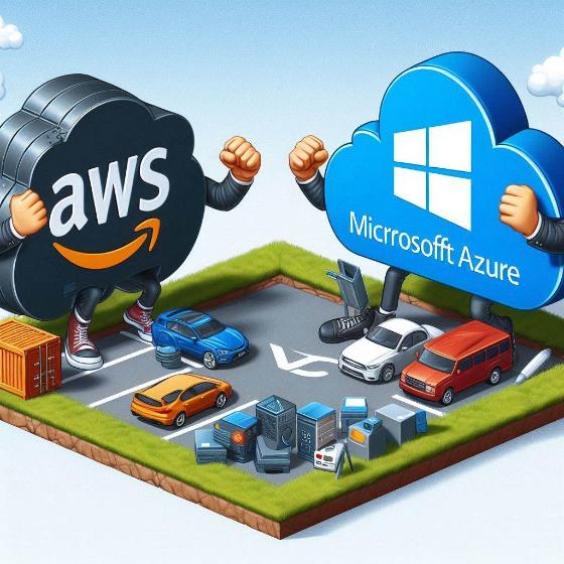Amazon AWS vs Microsoft Azure, Which is the best cloud service provider?
When we talk about cloud computing, two giants stand out above all the others: Amazon Web Services (AWS) and Microsoft Azure. Both providers lead the market, offering a wide range of services that allow businesses to operate more efficiently, securely, and scalably. But which is the best option for your business? In this article, we will compare both services in key aspects such as prices, customer support, features, and more, to help you make an informed decision.

1. Prices: Which fits better with your budget?
Price is always a decisive factor when choosing a cloud service provider. However, directly comparing AWS and Azure can be complicated due to their different pricing structures and the diversity of their services.AWS uses a pay-per-use pricing model, which means you only pay for the capacity you consume. It has hourly or per-second pricing, depending on the service. It also offers different pricing options to save costs in the long term, such as subscriptions to reserved and spot instances.
Azure offers a similar model, but in some cases, its pricing structure is simpler and more competitive compared to AWS. Additionally, Azure tends to offer attractive discounts to enterprise customers, especially if they already use other Microsoft services.
2. Services and Features: Which is more complete?
Both providers offer a wide range of services, but they have different approaches and specialties:AWS stands out for the number of services it offers (more than 200). It has a wide range of options for computing, storage, databases, analytics, artificial intelligence, and more. Among its most well-known services are EC2 (Elastic Compute Cloud), S3 (Simple Storage Service), and RDS (Relational Database Service). AWS also has a solid offering of specialized services, such as machine learning with SageMaker and advanced tools for IoT.
Azure, on the other hand, has very strong integration with Microsoft's enterprise tools, such as Active Directory and Office 365. This makes it ideal for businesses that are already immersed in the Microsoft ecosystem. Additionally, Azure has gained ground in the field of artificial intelligence with Azure Machine Learning and in hybrid solutions with Azure Arc.

3. Ease of Use and Management
Ease of use and learning curve are important aspects to consider:AWS: Although AWS provides extensive documentation and a very active community, its management console can be intimidating for beginners. It is a powerful and flexible environment, but it requires some time to master.
Azure: In contrast, Azure has a more intuitive interface and integrates more naturally with popular development tools such as Visual Studio and PowerShell. This makes it more accessible to developers and IT administrators who are already familiar with the Microsoft environment.
4. Customer Support and Assistance
Both providers offer very similar levels of support, with options ranging from basic to more comprehensive enterprise plans:AWS: It has support plans ranging from free (which includes access to documentation and forums) to enterprise options that provide 24/7 access to engineers and guaranteed response times of less than 15 minutes for critical incidents.
Azure: It also offers free and premium support options, but it has a particularity: for enterprise customers who already have contracts with Microsoft, it is possible to access discounts on support plans or customized services.
5. Real-world Deployment: Who has a larger presence?
In terms of adoption and global presence:AWS: Since its launch in 2006, AWS has led the market, obtaining a significant share in almost all sectors. According to Gartner, AWS is the undisputed leader in terms of market share, with clients ranging from tech startups to giants like Netflix and Airbnb.
Azure: Although it arrived later to the market (in 2010), Azure has grown rapidly thanks to its integration with Microsoft products and services. It is particularly popular in sectors where Microsoft already had a presence, such as government and large corporations.
6. Energy Costs and Sustainability: Who is more "green"?
Sustainability and environmental impact have become important criteria for many businesses:AWS: It has committed to achieving 100% renewable energy by 2025 and has projects underway to reduce the carbon footprint of its data centers. However, due to its size, it still faces challenges in meeting these goals in all regions.
Azure: Microsoft has been more aggressive in its sustainability goals, committing to being carbon negative by 2030. This means it will not only reduce its carbon emissions but also remove more carbon than it emits.
7. Security and Compliance: Which is more secure?
In terms of security and compliance with regulations:AWS: It has a long list of compliance certifications, including ISO 27001, SOC 1/2/3, and certifications specific to sectors such as healthcare (HIPAA) and finance (PCI DSS).
Azure: It also has a complete list of certifications, but it stands out in specific sectors such as government, where it complies with regulations such as FedRAMP and other local regulations in countries outside the United States.






